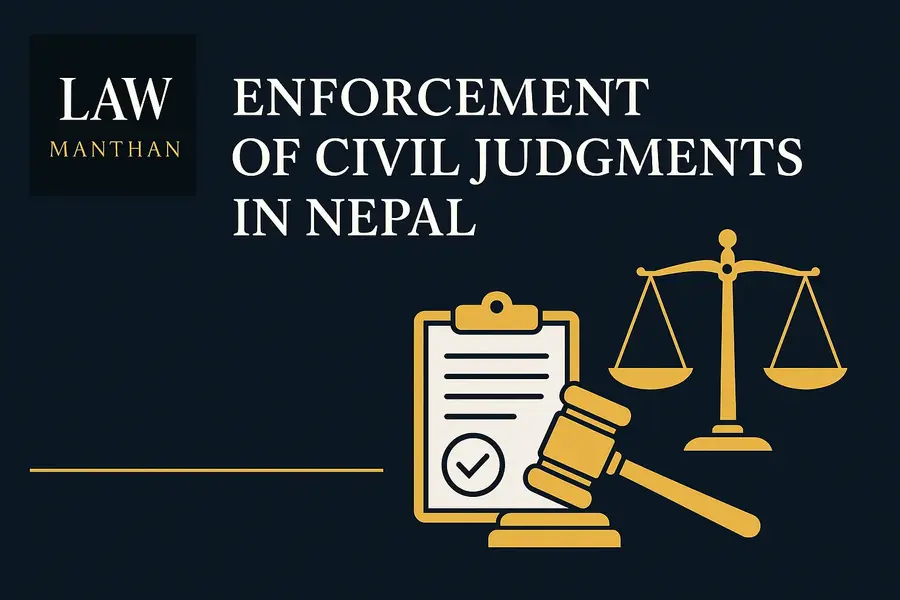Meaning and Definition
Enforcement of a civil judgment means putting the court’s final decision into actual effect. It is the process where the winning party gets the legal remedy that the court has ordered. In other words, it is the step taken after a court issues a verdict, to make sure the judgment is respected, followed, and implemented.
In Nepal, if the losing party does not willingly follow the court’s decision-whether it’s paying a certain amount, returning property, or fulfilling a contractual obligation-the winning party can request the court to enforce the judgment. Without proper enforcement, even a fair decision has no value. So, enforcement is a vital part of the justice system.
Importance of Enforcement
Enforcement is the final step of justice. It gives real value to the judgment passed after months or years of legal struggle. Without enforcement, justice is only on paper. For the victim or winning party, enforcement provides closure, dignity, and actual remedy. It also sends a message to the society that courts mean business and justice is real.
The enforcement of civil judgments strengthens the rule of law. It shows that no one is above the law, and everyone must follow court decisions—rich or poor, powerful or powerless. When courts enforce judgments fairly and quickly, it boosts public confidence and reduces unnecessary litigation.
Legal Framework
The Civil Procedure Code, 2074 (2017), mainly Sec. 229-253 and Civil Procedure Rules, 2075 Rules 51-59, governs the enforcement process in Nepal. The Constitution of Nepal, 2072 has guaranteed the right to justice and effective remedies. So, enforcement is not only a procedural matter but also a constitutional right.
When Does Enforcement Begin?
Enforcement begins only after a court issues a final and executable decision. If the case is still under appeal or within the appeal time limit (usually 30 days), the court does not generally enforce the judgment. But if there is no appeal or the appeal process ends, the winning party can start enforcement.
If the court’s decision is self-executing, such as canceling a document or declaring a status, then no separate execution process is needed. But for actions involving money, property handover, or personal duties, the winning party must file an execution application (also known as a “Ritta Sawal”).
How to Apply for Enforcement?
The court that issued judgment must submit a formal execution request to the district court. This application must include:
- Copy of the court’s final judgment.
- Request for specific action (e.g., seizure of property, arrest warrant, etc.)
- The court reviews the application and starts the execution process.
If parties don’t satisfy with execution, then they can file complaint against the proceeding taken by execution officer in accordance with Sec. 150 of Civil Procedure Code, 2074.
Steps in Enforcement
- The court issues a notice to the losing party (judgment debtor) asking them to obey the order within a certain period.
- If the debtor does not obey, the court can order the seizure of their movable or immovable property and sell it through auction.
- The court can freeze the debtor’s bank account or deduct the amount directly from their salary.
- In cases where the debtor hides or runs away, the court can direct the police to arrest them and bring them before the court.
- If someone knowingly refuses to follow the order, the court can take action for contempt under Section 160 of the Civil Procedure Code, 2074, which may include fines or even jail.
Different Methods of Enforcement
The most common enforcement is for monetary judgments, where the court can bigo bharaune (recover compensation) by seizing the debtor’s property, freezing their bank accounts, or deducting money from their salary. For property return, if someone illegally holds land or goods, the court can use police help to recover and hand it over to the rightful person.
If a party fails to fulfill a contract, the court may chalan chalaune (initiate execution) by assigning a third party to do it, with the cost recovered from the defaulter. For personal orders, such as stop trespassing or vacate property, disobedience may result in contempt of court with fines or jail.
Challenges in Enforcement
Enforcing civil judgments in Nepal faces delays, lack of cooperation from losing parties, weak property records, and limited court resources. Many people don’t know how to claim for enforcement, and rural enforcement is even harder. Political pressure and corruption also affect the process. As a result, justice often remains on paper unless enforcement systems improve and public awareness grows.
Conclusion
In Nepal, the enforcement of civil judgments is not just a technical process; it is a matter of justice, accountability, and legal empowerment. The Civil Procedure Code, 2074, and other laws provide a solid framework to ensure that judgments are effectively implemented. But to make enforcement efficient, courts, parties, and institutions must work together.
Every citizen should be aware that winning a case is not the end. Justice is truly served only when the decision is enforced. So, people must learn, act, and if needed, seek help to ensure that the court’s order is not ignored but respected and fulfilled.




